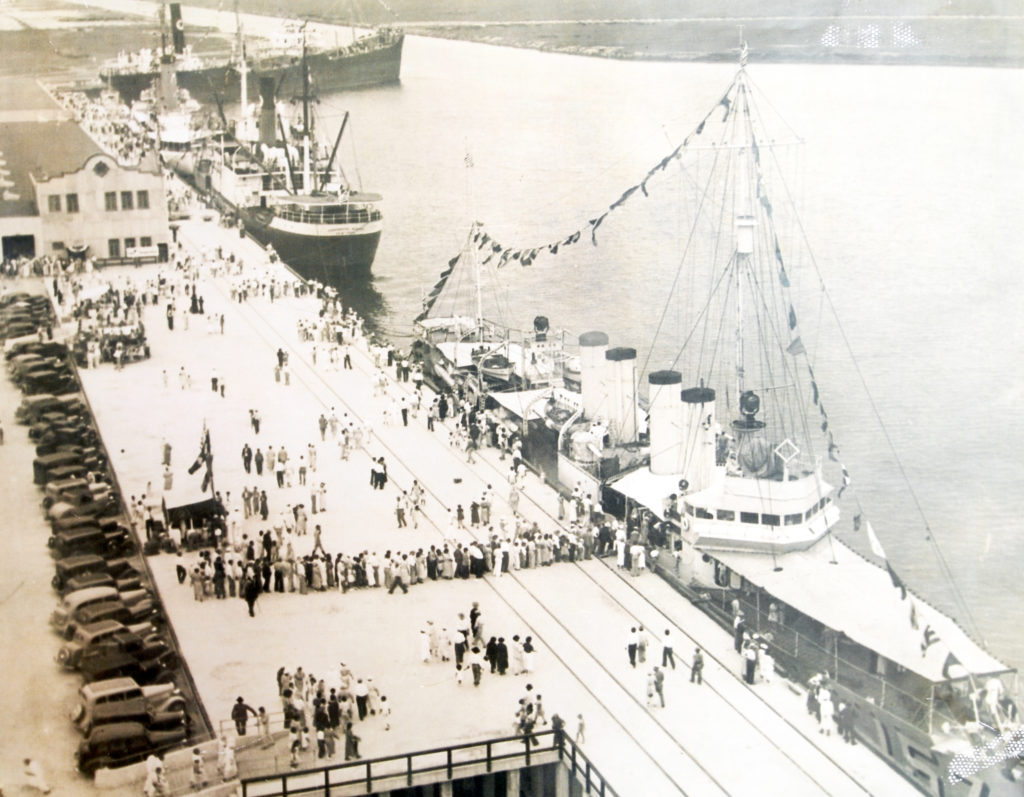

This research guide provides an overview into the 80+ year history of the Port of Brownsville. The purpose of this research guide is to offer students historical context though access to primary source materials house at UTRGV Special Collections & Archives as well as highlighting relevant secondary (books) and external (websites) resources.
Conceived in 1906 as a deep sea port by local fisherman Louis Cobolini and dredged by U.S. Army Engineers, the Port of Brownsville began official operations in 1936. It is the only deep water port located on the U.S.-Mexico Border and offers multimodal international transport. The Port has been critical to the economic development and sustainability of the region, employing 51,000+ workers and contributing $3B+ to the state economy. Known as one of the top free trade zones in the U.S., it has evolved from shipping commodities like citrus and cotton to steel and petroleum. The Port also offers scrap metal recycling and ship dismantling, serving as the nation’s chief U.S. Navy aircraft carrier dismantling program (Port of Brownsville, n.d.).
Brownsville Port celebration [opening of port; Shary address] May 14–16, 1936. John H. Shary Collection, ELIBR-0002, Container 2, Box 222, Folder 15. University of Texas Rio Grande Valley Special Collections and Archives, Edinburg Campus.
State, Dept of - Port of Brownsville, International Bridges Brownsville, 1977. Eligio (Kika) de la Garza Congressional Papers, ELIBR-0078, Container: 78, Box: 37, Folder: 158. University of Texas Rio Grande Valley Special Collections and Archives, Edinburg Campus.
![Port of Brownsville, Brownsville-Matamoros Area [MAP]](https://libapps.s3.amazonaws.com/accounts/113421/images/FN-000005.Jpeg)
Brownsville-Matamoros Area [Map]. Reference files, "Port of Brownsville" folder, "The Connecting Point" brochure. University of Texas Rio Grande Valley Special Collections and Archives, Brownsville Campus. (Image below)
![Industry: A key factor the port growth [Map]](https://libapps.s3.amazonaws.com/accounts/113421/images/FN-000004.Jpeg)
Industry: A key factor the port growth [Map]. Reference files, "Port of Brownsville" folder, "The Connecting Point" brochure. University of Texas Rio Grande Valley Special Collections and Archives, Brownsville Campus. (Image below)

Port of Brownsville, home port to NAFTA. (1999). [Map]. Brownsville Navigation District. University of Texas Rio Grande Valley Special Collections and Archives, Brownsville Campus.

Air view Port of Brownsville (post card). Brownsville Photograph Collection BLIBR-0044, Box 1, Folder 5. University Library, Special Collections and University Archives, University of Texas Rio Grande Valley, Texas Southmost College, Brownsville, Texas.

Photograph of a group of men loading banana's onto rail cars at the Port of Brownsville (no date). Matilda Ninfa Guillen, 1918 - 1949. Brownsville History Harvest 2014, UTRGV Digital Library, The University of Texas – Rio Grande Valley.

Four ships in Port of Brownsville channel, Monbaldo and Anubis. Brownsville Photograph Collection; BLIBR-0044, Box 1, Folder 5. University Library, Special Collections and University Archives, University of Texas Rio Grande Valley, Texas Southmost College, Brownsville, Texas.

U.S. Coast Guard and Tug Boat. Brownsville Photograph Collection; BLIBR-0044, Box 1, Folder 5. University Library, Special Collections and University Archives, University of Texas Rio Grande Valley, Texas Southmost College, Brownsville, Texas.

Port Area (Aerial Photo), 1950-08-01. Brownsville Photograph Collection; BLIBR-0044, Box 1, Folder 5. University Library, Special Collections and University Archives, University of Texas Rio Grande Valley, Texas Southmost College, Brownsville, Texas.
The research guides compiled by UTRGV staff and students are intended to assist patrons who are embarking upon new research endeavors. Our goal is to expand their knowledge of the types of resources available on a given topic, including books, archival materials, and websites. In so doing, our compilers have taken care to include collections, digital items, and resources that may be accessed not only through UTRGV but also via other institutions, repositories, and websites.
We wholeheartedly respect the research interests of others. Therefore, please contact us if you wish to submit a resource for consideration, or if you have a question about or an issue with a specific cited resource.
 Port of Brownsville : 60 years of service
by
Port of Brownsville : 60 years of service
by
 The Port of Brownsville : a maritime history of the Rio Grande Valley
by
The Port of Brownsville : a maritime history of the Rio Grande Valley
by
 Studies in Brownsville & Matamoros History
by
See the "The economic impact of the Port of Brownsville," by Randall Florey
Studies in Brownsville & Matamoros History
by
See the "The economic impact of the Port of Brownsville," by Randall Florey

Appointments are recommended for most new researchers. Our team is available in Brownsville and Edinburg to assist you with identifying resources.